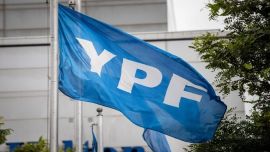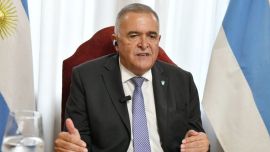Former president Cristina Fernández de Kirchner and eight other people convicted of corruption have been ordered to pay the equivalent of US$535 million in restitution by a local court.
Fernández de Kirchner, who led Argentina from 2007 to 2015 as head of state, lost a Supreme Court appeal last month against a fraud conviction for the mishandling of public works contracts while she was in power.
The ruling upheld a six-year prison sentence and a lifetime ban on her holding public office. Fernández de Kirchner is serving her sentence under house arrest at her apartment in the Constitución neighbourhood of Buenos Aires City.
After experts analysed "the damage to the public purse” and how much her actions cost Argentina, the court on Tuesday ruled that Fernández de Kirchner and her co-defendants must pay about 684.99 billion Argentine pesos, approximately US$535 million at the official exchange rate.
The ruling does not specify how much each should pay. The sum "must be deposited in the court’s account in the period of 10 working days," reads the ruling, a deadline extending until August 13 due the court winter holiday.
Otherwise the court threatened to seize money and auction properties confiscated from the convicted, according to the document.
Fernández de Kirchner filed papers in 2023 with the national Anti-Corruption Office which said she was worth the equivalent of around 250 million pesos (equivalent to some US$195,000 today).
News reports also suggest she owns various real estate properties, which she transferred to her two children some years ago.
Lawyers for Fernández de Kirchner have not yet said if they will appeal against the restitution order.
The co-defendants were either former government officials or businesspeople. They were given sentences of between three and half and six years in prison.
Other notable convictions in the case include businessman Lázaro Báez and ex-officials José López, Nelson Periotti, Mauricio Collareda, Raúl Daruich, Juan Carlos Villafañe, Raúl Pavesi and José Santibáñez.
Finding a figure
The headline US$535-million total to be covered by those convicted stems from the updating of the original figure of 84 billion pesos fixed in the sentence of December 6, 2022.
At the request of the court, Supreme Court experts recalculated the figure according to current indices, presenting their results last week.
With this new evaluation, which represents over US$540 million at the latest exchange rate, the court activated the formal claim.
The aim of the confiscation, according to the prosecutors Diego Luciani and Sergio Mola, is to recover the assets gained via crime and prevent those responsible from continuing to enjoy the economic benefits illicitly obtained.
In their plea, the prosecutors calculated the damage to the state on the basis of overpricing 51 tenders and the damaged occasioned by incomplete public works. That basis served to define the sum now being claimed.
Among the assets in the sights of the court are 213 properties, 14 vehicles and six companies. Some belong to Fernández de Kirchner, others to Lázaro Báez and the other co-defendants.
In the case of the former president, many of her assets were transferred to her children Máximo and Florencia as an anticipated inheritance.
Even so, her assets continue to be under court investigation and are frozen in other investigative cases, like the so-called ‘Hotesur’ and ‘Los Sauces’ probes, which have now been unified.
Assets embargoed in those cases include flats in Puerto Madero, garages, hotels in southern Argentina, properties in El Calafate and flats in the Santa Cruz provincial capital of Río Gallegos.
Fernández de Kirchner, 72, denies the corruption allegations and says she is a victim of a campaign of judicial and political persecution.
Magistrates have rejected an expert report presented by Fernández de Kirchner’s accountant, ratifying that the calculation to update the economic damage in the Vialidad (highways case) should be based on the consumer price index of INDEC statistics bureau, as applied at the beginning of the trial.
Báez, on his side, accumulated a greater quantity of assets. In the case known as “La Ruta del Dinero K,” another federal judge Sebastián Casanello ordered an analysis of his assets. It determined a total of US$120 million in properties, vehicles, ranches and aircraft.
Yet part of that sum is already committed – Báez was convicted for money-laundering and must face a fine of US$300 million, apart from the confiscation of a further US$55 million, resulting in a conflict over how his assets should be distributed among the different court cases.
– TIMES/AFP/NA
























Comments